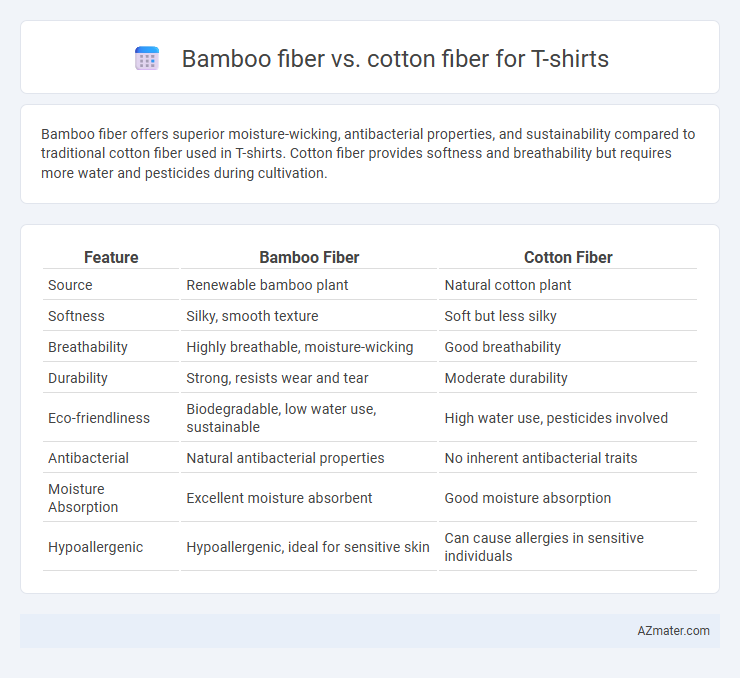Bamboo fiber offers superior moisture-wicking, antibacterial properties, and sustainability compared to traditional cotton fiber used in T-shirts. Cotton fiber provides softness and breathability but requires more water and pesticides during cultivation.
Table of Comparison
| Feature | Bamboo Fiber | Cotton Fiber |
|---|---|---|
| Source | Renewable bamboo plant | Natural cotton plant |
| Softness | Silky, smooth texture | Soft but less silky |
| Breathability | Highly breathable, moisture-wicking | Good breathability |
| Durability | Strong, resists wear and tear | Moderate durability |
| Eco-friendliness | Biodegradable, low water use, sustainable | High water use, pesticides involved |
| Antibacterial | Natural antibacterial properties | No inherent antibacterial traits |
| Moisture Absorption | Excellent moisture absorbent | Good moisture absorption |
| Hypoallergenic | Hypoallergenic, ideal for sensitive skin | Can cause allergies in sensitive individuals |
Introduction to Bamboo and Cotton Fibers
Bamboo fiber, derived from the pulp of bamboo grass, offers natural antibacterial properties and high moisture-wicking capabilities, making it ideal for activewear T-shirts. Cotton fiber, harvested from the cotton plant's seed hairs, is renowned for its softness, breathability, and durability, traditionally dominating the T-shirt market worldwide. Understanding the differences in their origin, texture, and performance helps consumers choose between sustainable bamboo fabric and classic cotton for optimal comfort and eco-friendliness.
Production Process Overview
Bamboo fiber production for T-shirts involves mechanically crushing bamboo stalks and treating them with enzymes to break down the plant's structure before spinning it into fiber, offering a sustainable alternative with lower water and pesticide use compared to cotton. Cotton fiber production requires harvesting cotton bolls, ginning to separate seeds from fibers, and extensive chemical treatments during spinning and dyeing, contributing to higher environmental impact. Bamboo's semi-mechanical process reduces chemical usage significantly, while traditional cotton cultivation and processing depend heavily on synthetic pesticides and water-intensive practices.
Environmental Impact Comparison
Bamboo fiber for T-shirts offers a significantly lower environmental footprint compared to cotton, requiring up to 70% less water and no pesticides during cultivation. Cotton farming contributes to approximately 24% of global insecticide use, posing risks to ecosystem health and soil quality. The biodegradable nature of bamboo fiber further reduces textile waste and pollution, making it a more sustainable choice for eco-conscious clothing.
Comfort and Softness Differences
Bamboo fiber in T-shirts offers exceptional softness due to its fine, smooth texture that feels gentle against the skin, often compared to cashmere, whereas cotton fibers tend to be coarser but improve softness with higher thread counts. Bamboo fabric is highly breathable and moisture-wicking, providing greater comfort in warm or humid conditions, while cotton retains more moisture, which can lead to a heavier, less comfortable garment when sweating. The natural antibacterial properties of bamboo fiber also enhance comfort by reducing odor, unlike cotton which lacks inherent antimicrobial benefits.
Moisture-Wicking and Breathability
Bamboo fiber exhibits superior moisture-wicking capabilities compared to cotton fiber, efficiently drawing sweat away from the skin to keep the wearer dry during physical activities. The natural porous structure of bamboo enhances breathability, allowing better airflow and temperature regulation in T-shirts. Cotton fiber, while breathable, tends to retain moisture longer, making bamboo a preferred choice for high-performance and activewear T-shirts.
Durability and Longevity
Bamboo fiber exhibits superior durability due to its natural strength and resistance to wear, maintaining fabric integrity after multiple washes compared to cotton fiber. Cotton fibers tend to weaken and lose shape over time, especially if low-quality, reducing the T-shirt's lifespan. Choosing bamboo fiber enhances longevity and sustains the soft texture, making it an excellent option for durable, long-lasting T-shirts.
Hypoallergenic and Skin Friendliness
Bamboo fiber is naturally hypoallergenic and resistant to bacteria, making it highly suitable for sensitive skin and reducing the risk of irritation compared to cotton fiber. Cotton fiber, while breathable and soft, can sometimes cause allergic reactions in individuals with sensitive skin due to its higher likelihood of retaining pesticides and chemicals unless organic cotton is used. Bamboo fiber's moisture-wicking properties also enhance skin comfort by keeping the skin dry and preventing bacterial growth, which contributes to its superior skin friendliness over conventional cotton.
Cost and Affordability
Bamboo fiber T-shirts typically cost more than cotton due to the eco-friendly processing and sustainable cultivation methods involved. Cotton fiber remains more affordable and widely accessible because of established production infrastructure and lower harvesting costs. Consumers seeking budget-friendly options often prefer cotton, while those prioritizing sustainability may accept higher prices for bamboo fiber garments.
Style and Color Retention
Bamboo fiber T-shirts exhibit superior color retention due to their natural moisture-wicking properties and smooth fiber surface, which allows dyes to adhere more effectively compared to cotton. Cotton fiber, while breathable and soft, tends to fade faster after multiple washes because of its porous texture that absorbs dyes less uniformly. Style-wise, bamboo fabric offers a silkier finish and drapes more fluidly, presenting a sleek and modern look, whereas cotton provides a classic, matte appearance favored for traditional casual wear.
Verdict: Which Fiber is Better for T-Shirts?
Bamboo fiber is better for T-shirts due to its superior moisture-wicking, breathability, and natural antibacterial properties, making it ideal for activewear and sensitive skin. Cotton fiber, while soft and durable, tends to retain moisture and can lose shape over time, especially in high-sweat scenarios. For sustainable, comfortable, and odor-resistant T-shirts, bamboo fiber outperforms cotton in most performance and environmental aspects.

Infographic: Bamboo fiber vs Cotton fiber for T-shirt
 azmater.com
azmater.com